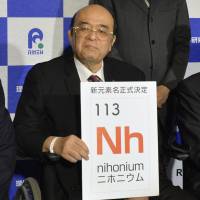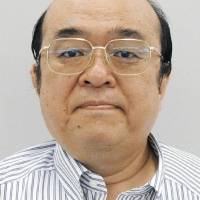The government-backed Riken research institute has said its proposed name for the atomic element 113 "nihonium" has been approved by an international body. It is the first case in which scientists from an Asian country have named an atomic element.
Nihonium was among the four atomic elements the International Union of Pure and Applied Chemistry formally endorsed Monday, along with Moscovium for element 115, Tennessine for 117 and Oganesson for 118, which were named based on proposals by U.S. and Russian teams.
The name, coined by a team of researchers at the institute, combines "Nihon" (Japan) with a general suffix for substances, and has the atomic symbol "Nh."
Kosuke Morita, a Kyushu University professor who led the team, welcomed the decision by the U.S.-based body.
"The periodic table is a great legacy in chemistry. I'm filled with deep emotion that there is an element with a Japanese name," Morita told a news conference on Thursday in Fukuoka city.
Noting that it will eventually be included in textbooks, Morita said he hoped children will be proud of nihonium and become interested in chemistry.
Nihonium is a superheavy, synthetically-made element with a half-life of less than a thousandth of a second — making it difficult to discover or put into practical use.
The artificially synthesized element has 113 protons in its nucleus. Morita's group created the element by colliding zinc ions with bismuth, which have 30 protons and 83 protons, respectively.
The team secured the naming rights last December after successfully creating the element three times in 2004, 2005 and 2012. A U.S.-Russian team had claimed to have discovered the element earlier than the Riken team, but IUPAC concluded the Riken team had discovered it first.




